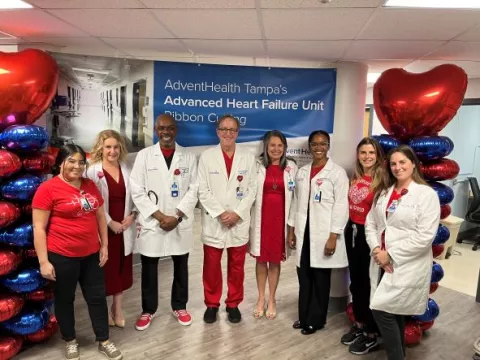- AdventHealth
Florida Hospital Pepin Heart Institute was the first hospital in Tampa to offer patients with non-valvular atrial fibrillation (AFib) an alternative to long-term warfarin medication with the newly approved WATCHMAN Left Atrial Appendage Closure (LAAC) Implant. Since first offering the procedure in April of 2015, Florida Hospital Pepin Heart Institute doctors successfully implanted the Watchman device in four patients, significantly improving their odds of avoiding a stroke associated with their heart rhythm issues.
AFib affects an estimated five million people in the United States and is a condition in which the heart beats irregularly. Although the condition itself isn't life threatening, one in three people who have AFib will suffer a stroke, according to the American Heart Association.
There's a pocket of tissue in the heart called the left atrial appendage. With the irregular heartbeats associated with AFib, blood isn't pumped out of the heart efficiently, causing it to collect in that pocket. This creates a dangerous condition in which the blood may clot and travel to the brain, causing a stroke, says Kenneth Yamamura, MD, an electrophysiologist who is specially trained to implant the WATCHMAN device at Florida Hospital Pepin Heart Institute. Strokes that occur because of AFib are more frequently fatal or disabling.
To lower the risk for stroke, patients with AFib are typically prescribed blood thinners such as warfarin, which affect the bloods ability to clot. For patients who have reason to seek a non-drug alternative, the WATCHMAN LAAC Implant is available to reduce their risk of AFib-related stroke. The WATCHMAN Implant closes off the left atrial appendage (LAA) to keep harmful blood clots from the LAA from entering the blood stream. By closing off the LAA, the risk of stroke may be reduced and, over time, patients may be able to stop taking warfarin.
There can be issues with the use of blood-thinning medications such as warfarin, including a chance of heavy bleeding, interactions with other medications, and certain medical conditions that can prevent people from safely taking them, says Asad Sawar, MD, who also performs the WATCHMAN procedure at Florida Hospital Pepin Heart Institute. For patients who cannot take these medications, the WATCHMAN is a clinically proven, potentially life-saving alternative.
Implanting the WATCHMAN Device is a one-time procedure that usually lasts about an hour. It is a minimally invasive procedure that doesn't require open-heart surgery. Following the procedure, patients typically need to stay in the hospital for 24 hours.
We are excited to offer this one-of-a-kind treatment at Florida Hospital Pepin Heart Institute, said Thomas Nicosia, Assistant Vice President of Cardiovascular Services at Florida Hospital Tampa. For more than 20 years, Pepin Heart has been at the forefront of innovative cardiovascular care. The WATCHMAN is another example of how were bringing the latest technology, procedures, and expertise to the Tampa Bay community.
Recent News
The spirit of the season filled the air at AdventHealth Wesley Chapel earlier today during the hospital's annual Christmas by the Piano celebration. Patients, visitors, team members and community...
In an interview with ABC Action News anchor Paul LaGrone, Dr. Doug Ross, Chief Medical Officer of AdventHealth Tampa, discussed the signs and symptoms of Legionnaires’ disease, following the recent...
AdventHealth Tampa has been awarded on Newsweek's list of America's Best Maternity Hospitals 2023.
AdventHealth Tampa is proud to announce the accreditation of its Obstetrics and Gynecology Residency Program, helping improve access to women’s healthcare in the Tampa Bay region.
AdventHealth Tampa is the first hospital in the West Florida region offering an innovative therapy for patients experiencing heart failure, with the goal of reducing hospitalizations and improving the...
Grade reflects top national performance on patient safety through COVID-19 pandemic
The new unit at AdventHealth Tampa’s Pepin Heart Institute allows cardiologists to provide advanced therapies that improve outcomes for patients.
AdventHealth Tampa has received its 9th consecutive "A" grade from the prestigious Leapfrog Group.
AdventHealth Tampa is pleased to announce our Tampa Wound Care Center has received accreditation from the Undersea and Hyperbaric Medical Society (UHMS).
The program will start with internal medicine residents and will expand to provide additional medical specialties.
Hurricane staffing and emergency activations are underway at all locations in Greater Tampa Bay, the Heartland Region and Greater Marion County.
The health system announced its plan to offer mental health access at 10 AdventHealth Express Care at Walgreens locations throughout greater Tampa Bay.












